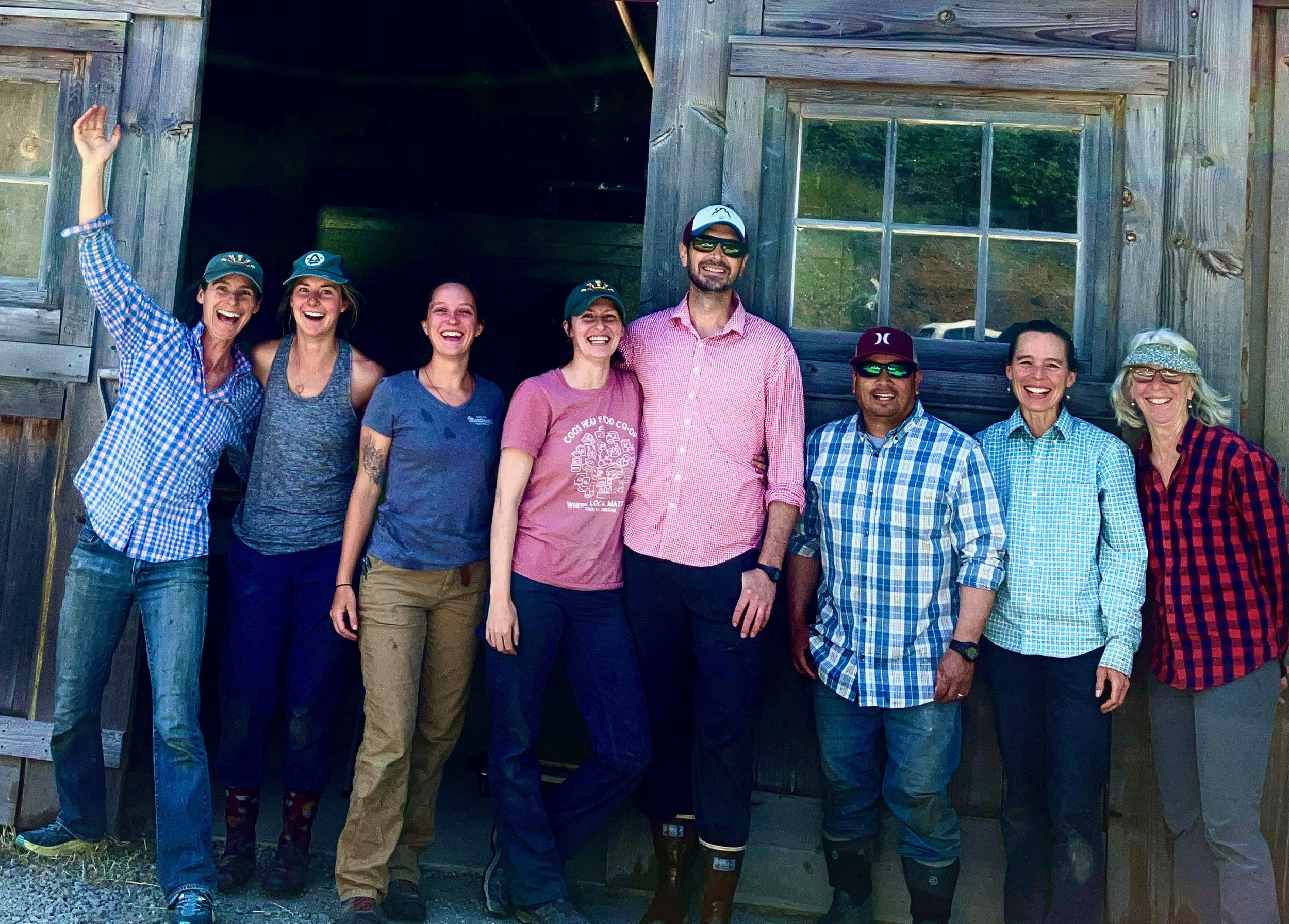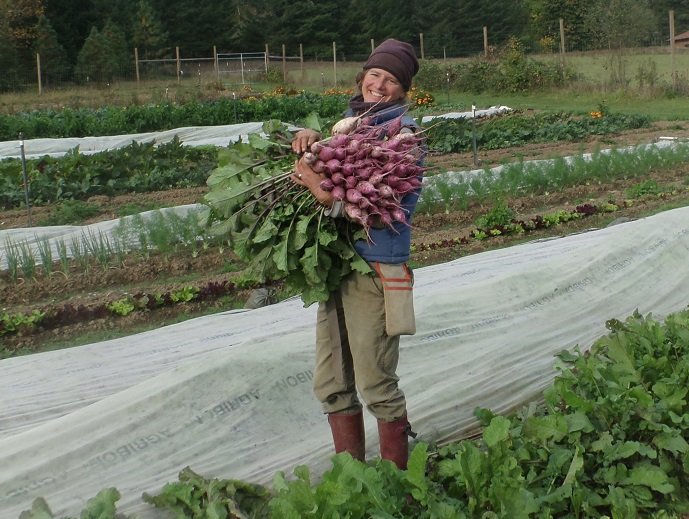Sweet Water FARM
1 APPRENTICESHIP
FULL TIME (35 hours/week)
START/END DATES: June - December
$17/HR
LOCATION: Hugo (Rogue Valley Chapter)
YEARS IN PRODUCTION: 19
PREVIOUS YEARS HOSTING: 1
PRACTICES: Organic Practices (Not Certified)
ACRES IN CULTIVATION: 2.5
Vegetables, Cut Flowers, Fruit, Hemp, Culinary Herbs
ON-FARM HOUSING? Yes
VEHICLE REQUIRED? Yes
LANGUAGES SPOKEN: English, Spanish
Women Owned/Operated
The mission at Sweet Water Farm is to grow healthy food and take care of a special piece of the Earth at the same time. We are honored and fortunate to be in the position to take on this beautiful and challenging task. Both of our children were born on and fed from this land. The farm has been a conduit to connect with and nourish countless people in our community for the past 19 years. We intend to continue using Sweet Water Farm to learn and push the limits of sustainable food production in the Rogue Valley. We aim for Sweet Water Farm to be a place where humans can connect with the endless cycles of the Earth and return to their lives with purpose and energy.
Farm overview
Sweet Water Farm is located in Hugo, Oregon about 15 minutes north of Grants Pass and 15 minutes east of the Rogue River. Cool and wet winters contrast with hot and dry summers. Spring and fall are world-class beautiful and mild. Pine and oak savannah is the native ecosystem here with fir, cedar, and manzanita as other dominant species.
The home site is ¾ of an acre of sloping 75-foot beds for annual vegetable production, a circle garden with perennial flowers and asparagus, and a small variety of fruit trees and berries. We also lease 2 acres from our next-door neighbor which has a section of 100-foot beds and a section of 200-foot beds for annual vegetable production plus potatoes, onions, winter squash, garlic, and hemp. We have a propagation hoop house and two hoop houses for hot-weather crops in the spring and summer and cold-weather crops in the fall and winter.
We use a BCS and a 4-wheel Kabota for soil prep and mowing. We aim to leave soils covered with growing plants, mulch, or tarps as much as possible to limit erosion and preserve soil life. We only apply OMRI-certified amendments and compost to the soil. Lots of 5-gallon buckets are lifted, carried, and dumped at Sweet Water Farm. Weeding and cultivation in beds are all done by hand and hand tools. Transplanting is done by hand, but this year we are going to experiment with the paperpot transplanter.
Sweet Water Farm is entering its 19th year as a primary vendor at the Grants Pass Growers Market. This farmers market is a bustling event every Saturday all year round and is the oldest market in the state of Oregon. We also provide produce for a few local restaurants, a natural food store, and a food co-op.
Plans for 2025 include a half-acre expansion of veggie production, construction of a 90’x24’ foot hoop house and a 20’x18’ equipment building, the raising of a new flock of chickens and a couple of pigs, and planting of fruit trees, medicinals, and perennials.
Sam and Denise live in the main house on the property with their 14-year-old daughter Ivory, 2 dogs Benny and Ricky, and a cat Pedro. Their 18-year-old son Ari lives in his own house and takes care of a small flock of chickens. There is also a house that is occupied by our friends-a couple in their 30s with a 5-year-old son and 3-year-old daughter.
Training and Expectations
We will teach Apprentices every aspect of running a successful season of farming.
These include:
Farming mindset and self-care strategy
Understanding and implementing a full-year planting calendar/schedule
Understanding time/labor requirements regarding calendar/schedule
Record keeping
Seed propagation and prop-house management
Soil preparation and transplanting
Soil cultivation and weed management
Greenhouse management and trellising
Cut Flower cultivation and bouquet/floral design
Harvesting, washing, and packing of produce
Growers’ market setup and marketing
The Apprentice will be expected to work 35 hours a week, split into five 7-hour days, with two days off per week. During the height of the season, the Apprentice may work extra hours if desired. A week off for a vacation mid-season can be scheduled. Tasks are physically challenging and repetitive at times, but the Apprentice will not be asked to do anything Sam and Denise have not done countless times each year for decades. The Apprentice will be taught body positioning for all tasks to maximize efficiency, avoid injury, and increase strength.
Apprentice will be integral to the success of Sweet Water Farm for the 2025 season. As we plan to increase yields this year, develop farm infrastructure, and grow more food and independence than ever, Denise and Sam will develop a schedule and plan that is specific and realistic and aims to coincide with the non-negotiable flow of the Earth. As planting and harvesting dates are crucial to success, the Apprentice will be given significant responsibility in making this plan a reality. They will help Sam and Denise seed, germinate, transplant, irrigate, weed, harvest, clean, and sell hundreds of thousands of plants. Getting healthy food to the people is the mission. Simply put, this is how you can make farming an occupation that allows you the freedom to be your own boss and work from the land where you live. Managing the landscape in a way that keeps things neat and organized, manageable, productive, and beautiful while also doing so in a way that nourishes the Earth will be our goal.
When the Apprentice arrives on June 1, much of the initial steps will already be rolling for the year. The first two large veggie successions, storage onions, leeks, the main flower patch, five salad/lettuce plantings, and one greenhouse will already be planted. The Apprentice will step right in and take over many of the day-to-day tasks that keep the farm running. Maintenance/Mowing Monday focuses on keeping the seeding and soil prep schedule flowing and the grass and edges mowed and trimmed. Trellis/Transplant Tuesday focuses on trellising greenhouse tomatoes and cucumbers as well as getting the next transplants in the ground. Weeding Wednesday keeps our beds cultivated and our plants healthy and charging without too much competition. Thorough Thursday is our day to finish any needed tasks and start harvesting for Market. Friday is all harvesting, washing, and packing of produce. Saturday is Market day when we get to bring the goods to the people!
We will harvest and cure garlic as well as transplant the summer veggie succession, melons, and winter squash in June. Every 2 weeks we will transplant head lettuce and salad mix. In July we will transplant our second to last veggie succession, keep the onion and leek patch well-weeded, and plant out our hemp field. In August we will transplant our final fall succession of overwintering veggies, harvest and cure storage onions, and seed overwintered onions. In September we will start to enjoy the warm days, cool nights, and the bounty of fall, harvest the potatoes and begin to pick and cure the hemp crop. In October we will harvest and cure winter squash, flip a greenhouse from tomatoes to greens, and pick sensitive crops and dried flowers before the freezes hit. In November we will plant garlic and overwintered onions, fill up another greenhouse with cold-weather veggies, and clean the fields up and seed cover crops before things get too wet. In December we will rest and get ready to do it all again!
QUALIFICATIONS
The Apprentice must have at least two full seasons of farming experience and have the goal of operating their own farm in the future.
Compensation / ACCOMMODATIONs
We will start apprentices at $17/hour. The Apprentice receives 15 minutes of paid self-care per day. Accommodation is a tiny house on the property with electricity, a kitchen, a shower, a sleeping loft, and a composting toilet for $600/month. The cabin is separate from other housing on the farm, is private, and has a nice little deck.
Equity and Inclusion
We appreciate anyone who wants to help us in the mission to grow healthy food and care for the Earth. Sweet Water Farm operates with the utmost respect for the people we employ and interact with in the community. We encourage honest and open communication and everyone is given equal opportunity to provide feedback and air grievances. We do not judge others for who they are, and we expect the same in return.












